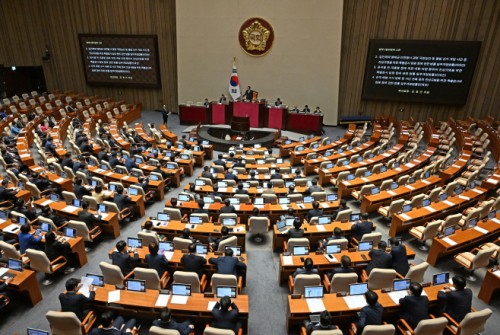 |
| Woo Won-sik, Speaker of the National Assembly, presides over a plenary session at the National Assembly in Seoul on September 11, where amendments to three special prosecutor bills were introduced. / Source: Song Ui-joo |
The bipartisan compromise on three special prosecutor bills — concerning the insurrection case, First Lady Kim Keon-hee, and a Marine’s death in the line of duty — unraveled within a day. Hopes for political cooperation following President Lee Jae-myung’s luncheon with party leaders quickly faded as Democratic Party leadership and hardline supporters rejected the deal, pushing the situation back into a confrontational stalemate.
On September 11, the National Assembly convened a plenary session and swiftly put the bills to a vote, just hours after the Democratic Party decided to force through the original versions. The amendments maintained provisions from the judiciary committee’s draft, including extended investigation periods and expanded personnel, while adding new clauses excluding military prosecutors from special counsel oversight, removing the National Investigation Headquarters from special counsel control, and conditionally allowing live broadcasts of first-instance trials in the insurrection case.
The day before, Democratic Party floor leader Kim Byung-ki and People Power Party floor leader Song Eon-seok reached a compromise after six hours of negotiations. Their deal dropped the investigation period extension, limited staff increases to 10, removed clauses on military prosecutor oversight after the special counsel term, and eased mandatory broadcast rules for insurrection trials. But the compromise immediately faced backlash from Democratic Party hardliners.
Democratic Party leader Jung Chung-rae told reporters, “The core of the special prosecutor bill is extending the investigation period. A deal without that is unacceptable,” instructing his party to reopen negotiations. Judiciary Committee Chair Choo Mi-ae argued that “the revision must focus on expanding personnel and extending the investigation period,” while senior party official Jun Hyun-hee also publicly opposed the deal. The Democratic Party soon reverted to its original version, which passed the plenary session that same day.
The People Power Party denounced the move. Song Eon-seok said at a leadership meeting, “President Lee spoke of cooperation, but on his 100th day in office he has given the people the ‘gift’ of breaking bipartisan consensus. The ruling Democratic Party must bear full responsibility for the paralysis of parliament.” Deputy floor leader Yoo Sang-bum added, “Is the Democratic Party just following the will of a single man, Representative Jung Chung-rae?”
The collapse of the compromise effectively ended the brief atmosphere of cooperation that emerged after President Lee’s meeting with opposition leaders on September 8. People Power Party Chairman Jang Dong-hyuk criticized, “What the floor leaders agreed on was overturned by the ‘Yeouido president’ and the ‘Chungjeongno president,’ bringing us here. The real president should have shown flexibility by accepting at least some of the proposed changes.”
With this clash, analysts predict the regular session of the National Assembly will face escalating legislative gridlock from the outset. Beyond the special prosecutor bills, confrontations are expected to extend to other contentious issues, such as the Democratic Party’s push to abolish the prosecution service and revise the Government Organization Act, leading into the upcoming parliamentary audit.
Most Read
-
1
-
2
-
3
-
4
-
5
-
6
-
7





















